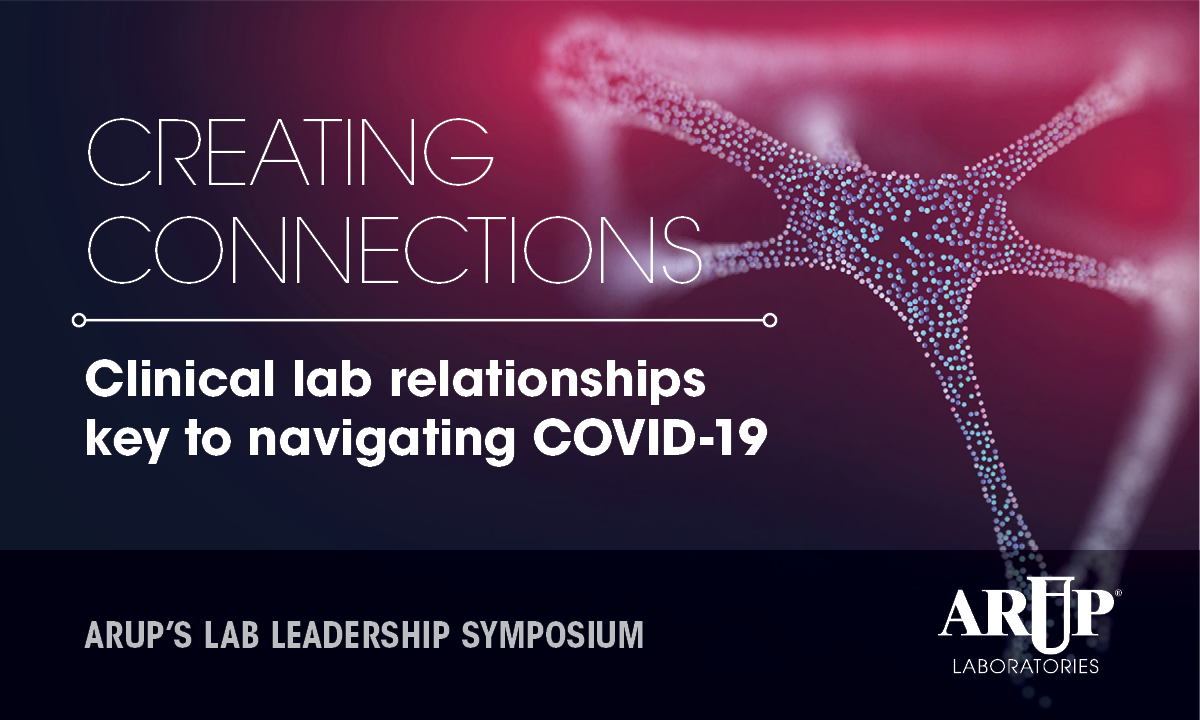
Managing the challenge of a global healthcare crisis such as the COVID-19 pandemic requires collaboration, clear and abundant communication, and planning to allow a healthcare system to adapt.
A strong relationship with your clinical laboratory is also critical.
“I can’t emphasize enough the capability of our lab,” said Michael Dowling, president and CEO of Northwell Health, New York’s largest healthcare provider. “The lab was a key member of [our response] from the first day.”
Dowling made his remarks on Thursday, October 21, as he and his colleague Dwayne Breining, MD, executive director of the Northwell Health labs and director of Pathology and Laboratory Medicine at Forest Hills Hospital, delivered the keynote speech at ARUP Laboratories’ first Lab Leadership Symposium.
It was the first time Dowling and Breining gave a joint address on how Northwell navigated the first year of the pandemic.
The symposium, “Creating Connections: Advancing Your Lab’s Value in the Healthcare System,” was designed to equip laboratory professionals with strategies to use to spotlight the lab’s pivotal role across not only clinical teams but also operations and case management.
When COVID-19 hit the United States in the spring of 2020, Northwell quickly became an epicenter. During the first wave of the virus, Northwell treated more patients than any other health system in the United States in its hospitals, emergency departments, urgent care centers, and physicians’ offices.
“The lab during this time was absolutely central and important,” Dowling said. One of the first labs allowed to do testing, Northwell conducted some 47,000 SARS-CoV-2 tests between March 1 and April 10, 2020, alone.
Even with more than three football fields of laboratory space, handling the volume of testing was challenging, Breining said. At the start, Northwell could only perform about 80 molecular diagnostic tests per day. After adding testing platforms and procuring supplies, Northwell Health was eventually able to perform up to 17,000 test per day. “You’ve always got to think about the scalability of things when you need to grow things this fast,” Breining said.
Coordination with stakeholders outside your health system is key, he added. Northwell had strong relationships with vendors and good working relationships with state, local, and community leaders and organizations that allowed it to pivot in response to changes in the COVID-19 landscape.
For example, when it became clear that the distribution of testing was uneven across ZIP codes, Northwell leveraged its relationships to get serology testing out to the communities that needed it most. Results from those tests helped officials predict where cases were spiking and how the virus was spreading.
Inside the lab, close coordination, communication, and out-of-the-box thinking had a huge impact. Lab leaders met daily to plot next steps and discuss what was coming next. When the supply chains stalled, Northwell faced a shortage of nasal swabs, so the lab responded by using a 3D printer to make its own, Breining said.
That kind of innovation is one of the pandemic’s positive outcomes. The next wave of testing is already in development—with the support of the Bill and Melinda Gates Foundation—and includes an ultrahigh-throughput polymerase chain reaction test based on those used in the agricultural and food industry to test up to 100,000 samples each day, Breining said.
“I believe at the end of the day, we can be better for it,” Dowling said of the pandemic. “Creativity blossomed during that period of time and one of my hopes is that as we go forward, we can maintain the same level of innovation and creativity.”
ARUP presenters rounded out the symposium. Andrew Fletcher, MD, ARUP medical director of Consultative Services, spoke about the vital role laboratory medicine plays in driving Centers for Medicare and Medicaid Services (CMS) quality metrics. Rick Panning, MBA, ARUP senior healthcare consultant and former senior administrative director of Laboratory Services at HealthPartners, shared his thoughts about establishing strong working relationships with executive-level decision makers.
Panel discussions led by ARUP’s Brian Jackson, MD, ARUP medical director of Support Services, IT, and Business Development, and ARUP’s Sandy Richman, MBA, ARUP Consultative Services director, explored what health systems should expect from client laboratories and discussed the effects of lab stewardship and outreach on the continuum of care.
The panelists included Jon Burns, senior vice president and system chief administrative officer, University of Maryland Medical System; Alison Flynn Gaffney, executive director of University of Utah Hospital, Service Lines, and System Planning, University of Utah Health; Sterling Bennett, MD, senior medical director for the Central Laboratory at Intermountain Healthcare; and Gaurav Sharma, MD, division head of Regional Laboratories, Department of Pathology and Laboratory Medicine, Henry Ford Health System.
Jennifer Dobner, jennifer.dobner@aruplab.com
















